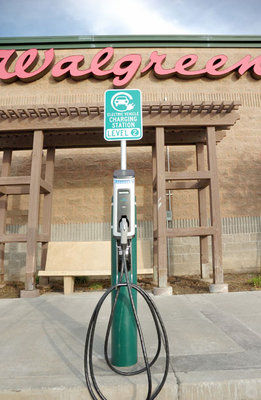
As gas prices creep north of $4 per gallon again, electrically powered vehicles — and the charging stations necessary to refuel them — are beginning to spring up across Scotts Valley.
On Wednesday, Feb. 15, the Scotts Valley City Council voted 5-0 to seek grant money from the Monterey Bay Unified Air Pollution Control District, and to commit $2,500 from the city’s general fund, in hopes of installing an electric-vehicle recharging station at the city’s new library.
With the council’s vote, Scotts Valley will be one of seven Monterey Bay-area communities included in the grant proposal being drafted by Andy Hartmann, business manager for the International Brotherhood of Electrical Workers, Local 234.
“Basically, the whole idea was to see if Scotts Valley was even interested in (the technology),” Hartmann said.
The grant money was made available to interested communities in Santa Cruz, Monterey and San Benito counties in 2010. If approved by the district, it would contribute about $7,500 toward the estimated $10,000 cost of installing a charging station, with the city’s $2,500 contribution covering the remainder.
According to Hartmann, the most common electric-vehicle charging station uses a standardized plug that delivers a 240-volt current — more than twice the power of a generic household wall socket.
Scotts Valley’s first electric vehicle charging station opened in March 2011 outside Zero Motorcycles’ headquarters, located on Technology Circle.
According to Zero Motorcycles’ Vice President of Strategy and Sustainability Jay Friedland, the charger features a dual 110-volt and 220-volt connector and is free to use.
“We view it as a convenience,” he said. “We view it as a service to the electric-vehicle community.”
Friedland estimated that every other day, a vehicle spends a few hours charging while the owners go grocery shopping or out to dinner at the nearby Victor Square shopping center.
“We’ve had Teslas, we’ve had Nissan Leafs, we’ve had Chevy Volts,” he said. “An hour on the charger will add 10 miles to the range of a Leaf.”
Friedland said that they offer the service for free as the cost of electricity is minimal and it increases the visibility of Zero’s own line of electric motorcycles.
Though it is a different style that the one the city is considering adding, a second 240-volt station was installed earlier this month outside the Walgreens in the Kings Village Shopping Center on Mount Hermon Road.
Walgreens Store Manager Tony Lipinski said that the station was part of an eco-friendly campaign by the chain that has similar stations installed in Santa Cruz and Watsonville.
Lipinski said while he was still learning the specifics of what operating the station would entail, that customers could activate the charging station by using the PayPass credit cards or dealer-issued charge cards.
“They told me that people with electric cars would know what they needed,” he said. “This is all such brand-new technology.”
Mayor Donna Lind said the city was excited about the prospect of adding a third charging station.
“There’s been a lot of enthusiasm,” she said. “(It’s) another way of our being progressive.”
Lind said that when the library was built, the power cables to the site were designed to be adequate to operate a charging station, should the opportunity arise.
She added that while the grant paperwork was drafted, the City Council and planning department were communicating with other municipalities that have charging stations in order to understand the technology better, as well as the costs and commitments associated with running it.
“It’s really exciting,” she said. “But we want to make sure and do our research, too.”
Lind said that a fee would likely be charged for use of the station, payable by credit card,
Hartmann said that, according to rules set by the California Public Utilities Commission, an entity can charge only a flat fee for use of its electric vehicle charging stations, regardless of the time or energy that is used; otherwise, it would be classified as a utility.
Corrie Kates, community development director for the city, said approval of the grant could take from three to six months. In that time, he said he planned to compare charging technology from different manufacturers.
City Councilman Dene Bustichi said he was excited about the idea, but he cautioned that a close eye must be kept on the costs of the plan, as well as the practicality of the equipment.
“The bigger issue is to find out really the nuts and bolts of this whole thing,” he said. “With technology these days, it moves so quickly that it’s often outdated by the time you install it — so we want to avoid that.”
To comment, email reporter Joe Shreve at jo*@*********er.com, call 438-2500 or post a comment at www.pressbanner.com.












